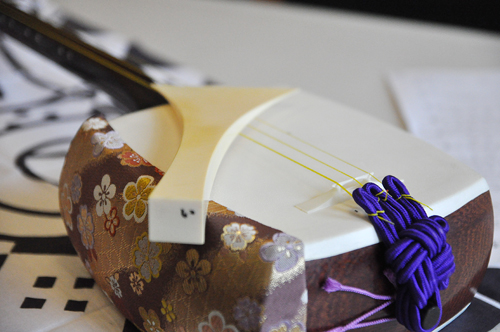The Tsugaru shamisen band Abeya will enliven the Portland State campus with a flood of intricate and exciting Japanese music this Thursday in the Lincoln Recital Hall. Abeya will perform on shamisen instruments accompanied by flutes, drums, singing and dancing.
Abeya brings Tsugaru shamisen to PSU

The Tsugaru shamisen band Abeya will enliven the Portland State campus with a flood of intricate and exciting Japanese music this Thursday in the Lincoln Recital Hall. Abeya will perform on shamisen instruments accompanied by flutes, drums, singing and dancing.
This high-energy event will serve as a celebratory commemoration of the U.S. Cherry Blossom Centennial and a unique introduction to traditional and modern Japanese music for the students of PSU.
When someone says “Tsugaru shamisen,” you may draw a complete blank. While this genre is unfamiliar to many people, it is definitely a style of music that is worth knowing. Rich with swells of complicated chord progressions, shamisen is a spirited form of Japanese music as lovely as it is captivating.
But what does “Tsugaru shamisen” really mean?
“The word ‘Tsugaru’ refers to the northernmost region of the main island of Japan,” said Japanese professor and event organizer Laurence Kominz. “People shut in during the long snowy winters learned to play shamisen and practiced complex melodies and rhythms for long hours, creating music that lifts the human spirit.”
Tsugaru is the most up-tempo, percussive and explosive form of shamisen.
“It is great fun to listen to and is enjoying a resurgence of popularity in Japan,” he added.
The shamisen is traditionally a long, guitar-like instrument made of wood with animal skin to cover the sounding box. An incredible array of sounds can be produced from the shamisen, though it is only a three-stringed instrument. There are also three different sizes of shamisen, which can produce a wide range of tunings.
“It can be played delicately with the fingers or strummed with a plectrum,” Kominz said. “The music ranges from delicate and wistful to bold and percussive.”
While shamisen music has held symbolic significance for the Japanese people for thousands of years, there has been a recent revival of shamisen in modern Japanese music.
“Northern Honshu, the main island, is the region that was struck by the recent devastating earthquake and tsunami, and now this form of music represents this region’s spirit of resurgence,” Kominz said.
In the wake of the tsunami, shamisen benefit concerts were held all across Japan and the U.S. to support relief efforts.
Students attending the event can expect more than just a stage of stationary shamisen players. The Abeya concert will include singers and dancers in stunning traditional Japanese costumes.
As the most intense and active style of shamisen music, the Tsugaru, as performed by Abey, will be a powerful representation of both traditional and modern Japanese music. The night promises to be one of vibrant color, surging whimsical music and non-stop entertainment.
“Tsugaru shamisen is high energy and fun to listen to—virtuoso musicianship. And Abeya has won many competitions with other troupes,” Kominz said. “It is regarded as the finest Tsugaru shamisen ensemble in Japan. Our audience is going to hear the best.”
Abeya is composed of Hidesaburo Abe, his two sons, Kinzaburo and Ginzaburo Abe, and musicians Tatsumaki Ando, Maya Nemoto and Ryu Gokita.
“The audience will get a tour de force of traditional Japanese folk music as well as a pulse of what contemporary Japanese music is like,” said Professor Jon Holt, a promoter of the Abeya event. “Keep in mind that, with the exception of the father, Abe Hidesaburo, most of the troupe is very young, so some of our PSU students will be seeing their peer group up there rockin’ the stage.”
Those experiencing Tsugaru shamisen for the first time are in for a real treat, he said.
“I would hazard a guess that many of the Vanguard readers are savvy and know of the popular Japanese fusion duo of the Yoshida Brothers, who also specialize in Tsugaru shamisen,” Holt added. “If they enjoy Asian-Western fusion music, they, too, will enjoy Abeya.”
The Abeya event is not be missed. The night will be brimming with bright, sonorous music and a spectacular display of Japanese culture.
“Thanks to the presence of faculty such as Dr. Jon Holt and Dr. Larry Kominz, on an almost annual basis the Japan Foundation selects Portland State as a venue for a world-class performing arts program sent on tour from Japan,” said Ken Ruoff, director of the Center for Japanese Studies at PSU. “We are more privileged than perhaps most people realize.”
Abeya: A Tsugaru Shamisen U.S. Tour Commemorating the U.S. Cherry Blossom Centennial
Thursday, April 12, 7:30 p.m.
Lincoln Recital Hall (room 75)
Students $6; general admission $10
Tickets available at PSU box office:
503-725-3307 tickets@pdx.edu






